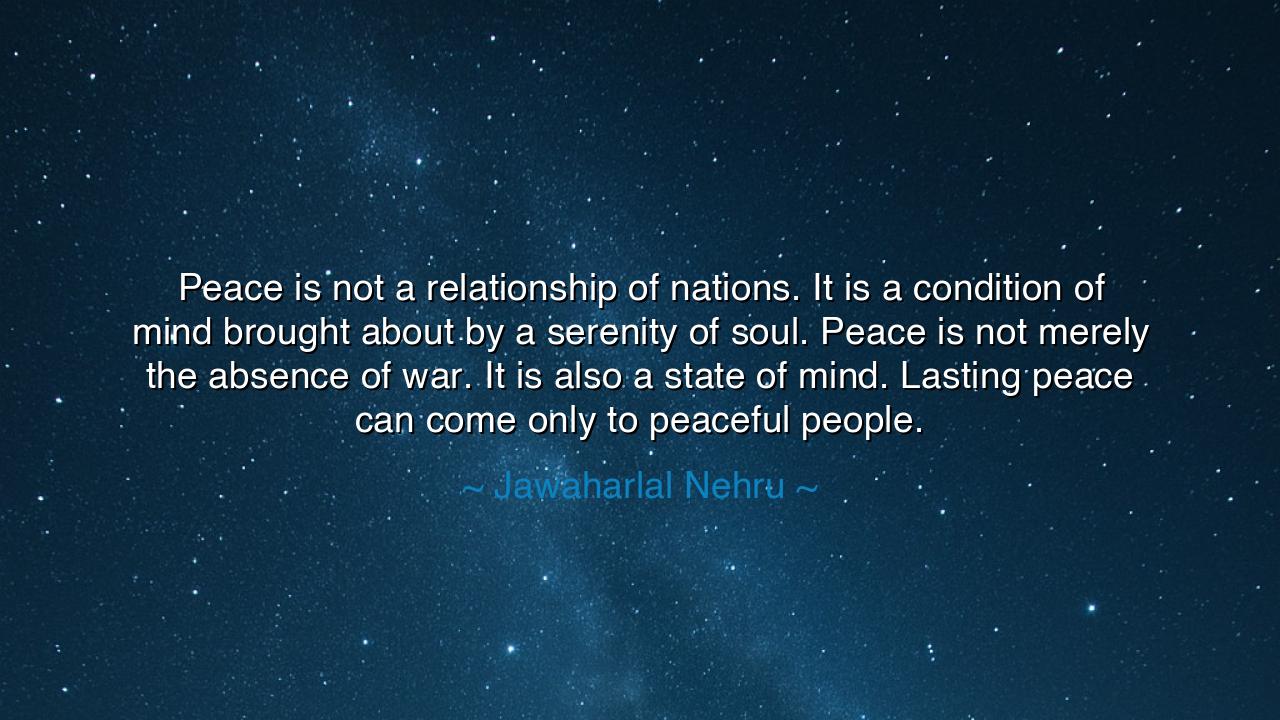
Peace is not a relationship of nations. It is a condition of
Peace is not a relationship of nations. It is a condition of mind brought about by a serenity of soul. Peace is not merely the absence of war. It is also a state of mind. Lasting peace can come only to peaceful people.






So spoke Jawaharlal Nehru, the first Prime Minister of free India, a man who had seen his homeland rise from chains into liberty: “Peace is not a relationship of nations. It is a condition of mind brought about by a serenity of soul. Peace is not merely the absence of war. It is also a state of mind. Lasting peace can come only to peaceful people.” These words resound like a bell across the centuries, for they reveal that peace is not a treaty signed on parchment, nor an alliance carved in stone. It is first and always the work of the human spirit.
The great error of rulers is to think that peace can be dictated from above, imposed by armies or secured by walls. Nehru reminds us that even if the cannons fall silent and borders are fixed, true peace may still evade the hearts of men. For anger, suspicion, and hatred remain like embers, ready to burst again into flame. Only when the soul itself is serene—when the storm of desire and fear has quieted—can peace endure. Thus, peace is not a mere arrangement between nations, but a condition born within individuals.
The ancients knew this truth. Consider the Stoics of Greece and Rome, who taught that the man who governs his own mind is freer than an emperor who conquers a thousand cities. Marcus Aurelius, emperor of Rome, fought wars on distant frontiers, yet wrote in his meditations that the true battlefield lay within, and the true victory was a tranquil soul. Without such inner serenity, no empire can hold; with it, even in the midst of conflict, a man may rest in peace.
History shows the difference between the false peace of silence and the true peace of the spirit. After the First World War, the nations gathered at Versailles to end the bloodshed. They signed treaties, drew borders, and proclaimed peace. But in their hearts there was no serenity, only bitterness, humiliation, and revenge. The so-called peace collapsed, and within a generation the world was aflame again. Contrast this with leaders like Nelson Mandela, who, after decades of suffering, emerged not with hatred but with forgiveness. Because his spirit was at peace, he was able to build reconciliation in a divided land. From peaceful souls arose lasting peace.
The lesson is clear: if we desire peace in our homes, in our nations, in our world, we must first cultivate peace within ourselves. A restless, angry heart cannot bring harmony to others. But the one who has mastered his anger, who has chosen mercy over vengeance, carries peace wherever he goes, like a lamp in the darkness. Nations are made of men and women, and if those men and women are not peaceful, no treaty can hold.
Therefore, let us practice daily the art of inner peace. Set aside time for silence, so that the noise of the world does not devour you. Forgive quickly, lest resentment root itself in your soul. Show compassion, even when wronged, for compassion disarms hostility. Above all, discipline the mind to seek serenity rather than endless striving, for the restless spirit cannot know peace. These small acts, multiplied by millions, can change not only a household but the fate of nations.
Thus Nehru’s wisdom shines as both warning and guide: “Lasting peace can come only to peaceful people.” It is not enough to silence the guns; we must also quiet the heart. It is not enough to build walls; we must also build understanding. For the true fortress of peace is not made of stone, but of souls at rest, minds at harmony, and nations led by those who have conquered themselves before seeking to govern others. And this is the path we must walk, if the world is ever to know the peace that endures beyond war.






AAdministratorAdministrator
Welcome, honored guests. Please leave a comment, we will respond soon